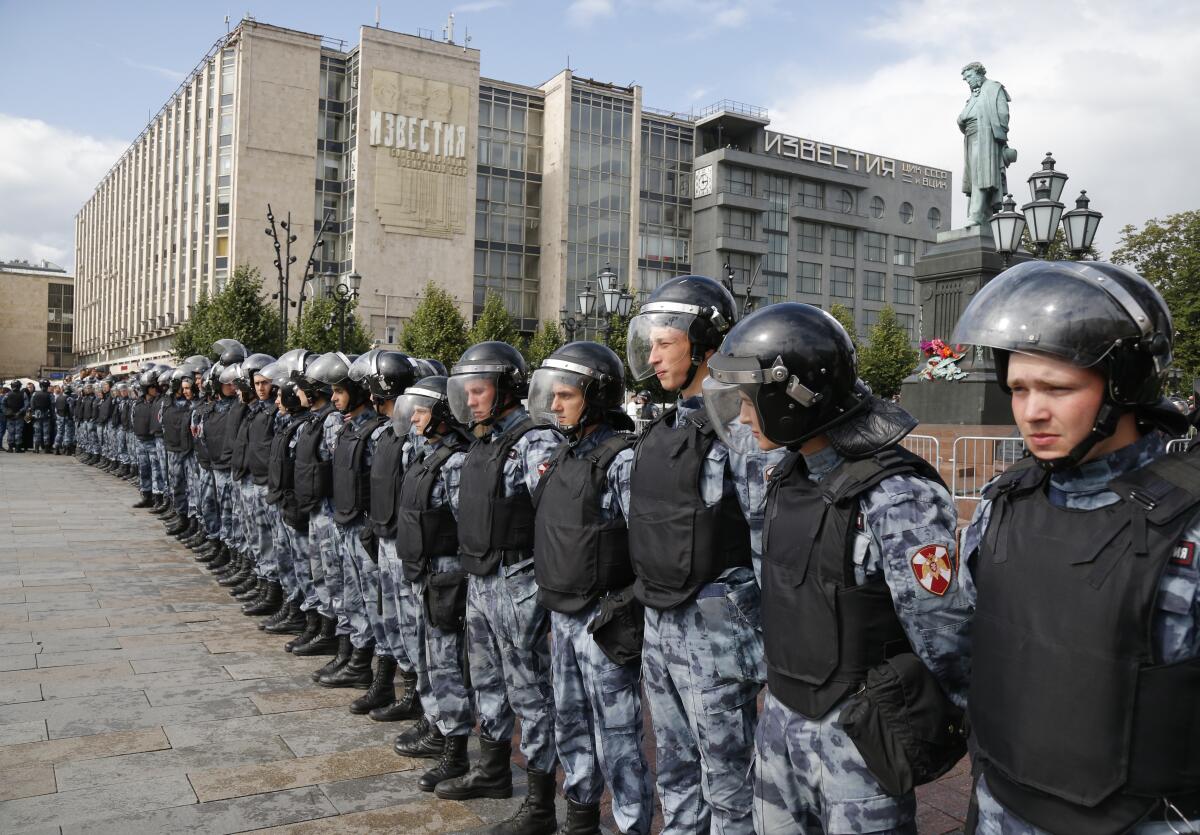Russian political crisis grows with more arrests in Moscow

- Share via
MOSCOW — For the second consecutive weekend, Moscow police conducted mass arrests as Russia’s biggest political crisis in several years continued to escalate and pose a challenge to the Kremlin’s heavy-handed approach toward public dissent.
More than 600 people were detained for participating in an unsanctioned rally in downtown Moscow, which opposition leaders had called to demand the inclusion of independent candidates in next month’s city council elections. At a mass rally on July 27, police took almost 1,400 people into custody and violently clashed with the thousands of protesters, beating some with truncheons.
Lybov Sobol, one of the candidates excluded from the election ballot and a leading voice in the demonstrations, was detained Saturday as she left her office on the way to the rally. Sobol has been on a hunger strike for three weeks, meant to put pressure on the Kremlin.
Protesters have been gathering in central Moscow for weeks to protest the Moscow Election Commission’s rejection of independent candidates on the Sept. 8 ballot for Moscow’s Duma, a 45-seat body that oversees the capital’s multimillion-dollar budget.
Many cited their frustration at candidates being excluded from what was designed to be a democratic process for electing regional representation. After last week’s police crackdown, some expressed anger on Saturday.
“I just want to live in a normal country,” said Sergei Nikforov, 22, a student from Moscow, who was attending his second protest. “Our constitution says we have a right to protest. They are denying us our rights. I don’t want to grow old in a country like this.”
Like Nikforov, many on Saturday were too young to have participated in the country’s last big political crisis from 2011-13, when hundreds of thousands of demonstrators rallied against alleged election fraud and protested the reelection of Russian President Vladimir Putin to a third term.
Underlining the new protests is a wave of uncertainty about elections in 2024, when Putin is scheduled to finish his fourth, and constitutionally final, term. Speculation about a Kremlin-managed transfer of power or a constitutional change to allow Putin to remain in charge has many younger Russians worried about what they view as an increasingly authoritarian state.
Opposition leaders had called for a rally Saturday through the city center along its tree-lined Boulevard Ring. But hours before the scheduled 2 p.m. kickoff, thousands of police and national guard officers in riot gear had already spread out across the city, blocking off streets and squares to prevent crowds from gathering.
Police helicopters hovered over Pushkin Square in the center of Moscow’s main thoroughfare, Tverskaya Street, a broad avenue leading to Red Square.
“We’re like a police state now,” said Igor Golovin, 57, as he stood just off Pushkin Square and watched the helicopters buzzing overhead. “Are they filming us or what? Why are they afraid of their own people?”
Before the protests, prominent opposition leaders, including some seeking to be candidates on the city election ballot, were sentenced for a week to a month in jail, charged with calling for participation in an unsanctioned rally. Alexei Navalny, a fierce Putin critic, has since claimed someone tried to poison him while he served 30 days behind bars.
Criminal cases have been opened against at least 10 opposition activists on charges of inciting a riot, allegations that could result in 15-year sentences.
More protests are likely on Aug. 10, but some analysts said the government is not likely to relent on barring the opposition candidates from the ballot.
“There is a consensus in the Kremlin that non-systemic candidates should not be allowed to participate,” said Tatyana Stanovaya, the founder of R.Politik, a political analysis firm, and a nonresident scholar at the Carnegie Moscow Center. “For the Kremlin, there is no discussing the question of power sharing. It’s a question of who is allowed to participate in the system. They don’t share power.”
More to Read
Sign up for Essential California
The most important California stories and recommendations in your inbox every morning.
You may occasionally receive promotional content from the Los Angeles Times.














